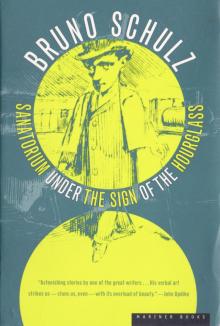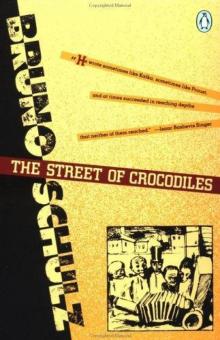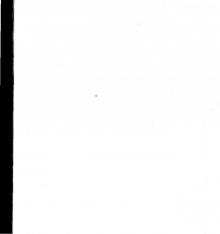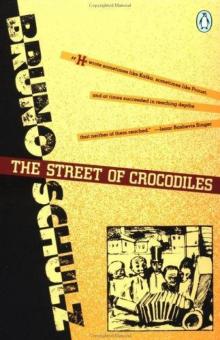- Home
- Bruno Schulz
The Fictions of Bruno Schulz Page 4
The Fictions of Bruno Schulz Read online
Page 4
THE STREET OF CROCODILES TAILORS' DtiMMIES small incident which occurred at that point of the lecture and to which we do not attach much importance. The incident, completely nonsensical and incomprehensible in the sequence of events, could probably be explained as vestigial automatism, without cause and effect, as an instance of the malice of inanimate objects transferred into the region of psychology. We advise the reader to treat it as lightly as we are doing. Here is what happened: Just as my father pronounced the word `dummy', Adela looked at her wristwatch and exchanged a knowing look with Polda. She then moved her chair forward and, without getting up from it, lifted her dress to reveal her foot tightly covered in black silk, and then stretched it out stiffly like a serpent's head. She sat thus throughout that scene, upright, her large eyes shining from atropine, fluttering, while Polda and Pauline sat at her sides. All three looked at Father with wide-open eyes. My father coughed nervously, fell silent and suddenly became very red in the face. Within a minute the lines of his face, so expressive and vibrant a moment before, became still and his expression became humble. He – the inspired Heresiarch, just emerging from the clouds of exaltation – suddenly collapsed -and folded up. Or perhaps he had been exchanged for another man? That other man now sat stiffly, very flushed, with downcast eyes. Polda went up to him and bent over him. Patting him lightly on the back, she spoke in the tone of gentle encouragement: `Jacob must be sensible. Jacob must obey. Jacob must not be obstinate. Please, Jacob . . . Please ...' Adela's outstretched slipper trembled slightly and shone like a serpent's tongue. My father rose slowly, still looking down, took a step forwards like an automaton, and fell to his knees. The lamp hissed in the silence of the room, eloquent looks ran up and down in the thicket of wallpaper patterns, whispers of venomous tongues floated in the air, zigzags of thought .. . Treatise on Tailors' Dummies, continuation The next evening Father reverted with renewed enthusiasm to his dark and complex subject. Each wrinkle of his deeply lined face expressed incredible cunning. In each fold of skin, a missile of irony lay hidden. But occasionally inspiration widened the spirals of his wrinkles and they swelled horribly and sank in silent whorls into the depths of the winter night. `Figures in a waxwork museum, ' he began, `even fairground parodies of dummies, must not he treated lightly. Matter never makes jokes: it is always full of the tragically serious. Who dares to think that you can play with matter, that you can shape it for a joke, that the joke will not be built in, will not eat into it like fate, like destiny? Can you imagine the pain, the dull imprisoned suffering, hewn into the matter of that dummy which does not know why it must be what it is, why it must remain in that forcibly imposed form which is no more than a parody? Do you understand the power of form, of expression, of pretence, the arbitrary tyranny imposed on a helpless block, and ruling it like its own, tyrannical, despotic soul? You give a head of canvas and oakum and expression of anger and leave it with it, with the convulsion, the tension enclosed once and for all, with a blind fury for which there is no outlet. The crowd laughs at the parody. Weep, ladies, over your own fate, when you see the misery of imprisoned matter, of tortured matter which does not know what it is and why it is, nor where the gesture may lead that has been imposed on it for ever. `The crowd laughs. Do you understand the terrible sadism, the exhilarating, demiurgical cruelty of that laughter? Yet we should weep, ladies, at our own fate, when we see that misery of violated matter, against which a terrible wrong has been committed. Hence the fright- ening sadness of all those jesting golems, of all effigies which brood tragically over their comic grimaces. `Look at the anarchist Luccheni, the murderer of the Express Elizabeth of Austria; look at Draga, the diabolical and unhappy Queen of Serbia; look at that youth of genius, the hope and pride of his ancient family, ruined by the unfortunate habit of masturbation. Oh, the irony of those names, of those pretensions! `Is there anything left of Queen Draga in the wax-figures likeness, any similarity, even the most remote shadow of her being? But the resemblance, the pretence, the name reassures us and stops us from asking what that unfortunate figure is in itself and by itself. And yet it must be somebody, somebody anonymous, menacing, and unhappy, some being that in its dumb existence had never heard of Queen Draga .. . 42 43
THE STREET OF CROCODILES TAILORS' DUMMIES ` Have you heard at night the terrible howling of these wax figures, shut in the fairbooths; the pitiful chorus of those forms of wood or porcelain, banging their fists against the walls of their prisons?' In my father's face, convulsed by the horror of the visions which he had conjured up from darkness, a spiral of wrinkles appeared, a maelstrom growing deeper and deeper, at the bottom of which there flared the terrible eye of a prophet. His beard bristled grotesquely, the tufts of hair growing from warts and moles and from his nostrils stood on end. He became rigid and stood with flaming eyes, trembling from an internal conflict like an automation of which the mechanism has broken down. Adela rose from her chair and asked us to avert our eyes from what was to follow. Then she went up to Father and, with her hands on her hips in a pose of great determination, she spoke very clearly. The two other girls sat stiffly, with downcast eyes, strangely numb... Treatise on Tailors' Dummies, conclusion _ On one of the following evenings, my father continued his lecture thus: `When I announced my talk about lay figures, I had not really wanted to speak about those incarnate misunderstandings, those sad parodies that are the fruits of a common and vulgar lack of restraint. I had something else in mind. ' Here my father began to set before our eyes the picture of that generatio aequivoca which he had dreamed up, a species of beings only half organic, a kind of pseudofauna and pseudoflora, the result of a fantastic fermentation of matter. They were creations resembling, in appearance only, living crea- tures such as crustaceans, vertebrates, cephalopods. In reality the appearance was misleading – they were amorphous creatures, with no internal structure, products of the imitative tendency of matter which, equipped with memory, repeats from force of habit the forms already accepted. The morphological scope of matter is limited on the whole and a certain quota of forms is repeated over and over again on various levels of existence. These creatures – mobile, sensitive to stimuli, and yet outside the pale of real life – could be brought forth by suspending certain complex colloids in solutions of kitchen salt. These colloids, after a number of days, would form and organize themselves in precipitations of substance resembling lower forms of fauna. In creatures conceived in this way, one could observe the processes of respiration and metabolism, but chemical analysis revealed in them traces neither of albumen nor of carbon compounds. Yet these primitive forms were unremarkable compared with the richness of shapes and the splendour of the pseudofauna and pseudo- flora, which sometimes appeared in certain strictly defined environ- ments, such as old apartments saturated with the emanations of numerous existences and events; used-up atmospheres, rich in the specific ingredients of human dreams; rubbish heaps, abounding in the humus of memories, of nostalgia, and of sterile boredom. On such a soil, this pseudo-vegetation sprouted abundantly yet ephemerally, brought forth short-lived generations which flourished suddenly and splendidly, only to wilt and perish. In apartments of that kind, wallpapers must be very weary and bored with the incessant changes in all the cadenzas of rhythm; no wonder that they are susceptible to distant, dangerous dreams. The essence of furniture is unstable, degenerate, and receptive to abnormal temptations: it is then that on this sick, tired, and wasted soil colourful and exuberant mildew can flourish in a fantastic growth, like a beautiful rash. `As you will no doubt know, ' said my father, `in old apartments there are rooms which are sometimes forgotten. Unvisited for months on end, they wilt neglected between the old walls and it happens that they close in on themselves, become overgrown with bricks and, lost once and for all to our memory, forfeit their only claim to existence. The doors, leading to them from some backstairs landing, have been overlooked by people living in the apartment for so long that they merge with the wall, grow into it, and all trace of them is obliterated in a complicated design of
lines and cracks. `Once, early in the morning towards the end of winter,' my father continued, `after many months of absence, I entered such a forgotten passage, and I was amazed at the appearance of the rooms. `From all the crevices in the floor, from all the mouldings, from every recess, there grew slim shoots filling the grey air with a scintil- lating filigree lace of leaves: a hothouse jungle, full of whispers and 44 45
THE STREET OF CROCODILES TAILORS' DUMMIES flicking lights – a false and blissful spring. Around the bed, under the lamp, along the wardrobes, grew clumps of delicate trees which, high above, spread their luminous crowns and fountains of lacy leaves, spraying chlorophyll, and thrusting up to the painted heaven of the ceiling. In the rapid process of blossoming, enormous white and pink flowers opened among the leaves, bursting from bud under your very eyes, displaying their pink pulp and spilling over to shed their petals and fall apart in quick decay. `I was happy,' said my father, `to see that unexpected flowering which filled the air with a soft rustle, a gentle murmur, falling like coloured confetti through the thin rods of the twigs. `I could see the trembling of the air, the fermentation of too rich an atmosphere which provoked that precocious blossoming, luxuri- ation, and wilting of the fantastic oleanders which had filled the room with a rare, lazy snowstorm of large pink clusters of flowers. `Before nightfall,' concluded my father, `there was no trace left of that splendid flowering. The whole elusive sight was a fata morgana, an example of the strange make believe of matter which had created a semblance of life.' My father was strangely animated that day; the expression in his eyes – a sly, ironic expression – was vivid and humorous. Later he suddenly became more serious and again analysed the infinite diversity of forms which the multifarious matter could adopt. He was fascinated by doubtful and problematic forms, like the ectoplasm of a medium, by pseudomarter, the cataleptic emanations of the brain which in some instances spread from the mouth of the person in a trance over the whole table, filled the whole room, a floating, rarefied tissue, as astral dough, on the borderline between body and soul. `Who knows,' he said, `how many suffering, crippled, fragmentary forms of life there are, such as the artificially created life of chests and tables quickly nailed together, crucified timbers, silent martyrs to cruel human inventiveness? The terrible transplantation of incompat- ible and hostile races of wood, their merging into one misbegotten personality. `How much ancient suffering is there in the varnished grain, in the veins and knots of our old familiar wardrobes? Who would recognize in them the old features, smiles, and glances, almost planed and polished out of all recognition? My father's face, when he said that, dissolved into a thoughtful net of wrinkles, began to resemble an old plank full of knots and veins, from which all memories had been planed away. For a moment we thought that Father would fall into a state of apathy, which sometimes took hold of him, but all of a sudden he recovered himself and continued to speak: `Ancient, mythical tribes used to embalm their dead. The walls of their houses were filled with bodies and heads immured in them: a father would stand in a corner of the living room – stuffed, the tanned skin of a deceased wife would serve as a mat under the table. I knew a certain sea captain who had in his cabin a lamp, made by Malayan embalmers from the body of his murdered mistress. On her head, she wore enormous antlers. In the stillness of the cabin, the face stretched between the antlers at the ceiling, slowly lifted its eyelids: on the half-opened lips a bubble of saliva would glint, then burst with the softest of whispers. Octopuses, tortoises, and enormous crabs, hanging from the rafters in place of chandeliers, moving their legs endlessly in that stillness, walking, walking, walking without moving ...' My father's face suddenly assumed a worried, sad expression when his thoughts, stirred by who knows what associations, prompted him to new examples: `Am I to conceal from you,' he said in a low tone, `that my own brother, as a result of a long and incurable illness, has been gradually transformed into a bundle of rubber tubing, and that my poor cousin had to carry him day and night on his cushion, singing to the luckless creature endless lullabies on winter nights? Can there be anything sadder than a human being changed into the rubber tube of an enema? What disappointment for his parents, what confusion for their feelings, what frustration of the hopes centred around the promising youth! And yet, the faithful love of my poor cousin was not denied him even during that transformation. ' 'Oh, please, I cannot, I really cannot listen to this any longer!' groaned Polda leaning over her chair. 'Make him stop, Adela .. The girls got up, Adela went up to my father with an outstretched finger made as if to tickle him. Father lost countenance, immediately stopped talking and, very frightened, began to back away from Adela's moving finger. She followed him, however, threatening him with her finger, driving him, step by step, out of the room. Pauline yawned 46 47
THE STREET OF CROCODILES and stretched herself. She and Polda, leaning against one another, exchanged a look and a smile. Nimrod I spent the whole of August of that year playing with a splendid little dog that appeared one day on the kitchen floor, awkward and squeaking, still smelling of milk and infancy, with a round, still unformed, and trembling head, paws like a mole 's, spreading to the sides, and the most delicate, silky-soft coat From the moment I first saw it, that crumb of life won the whole enthusiasm and admiration of which I was capable. From what heavens had that favourite of the gods descended, to become closer to my heart than all the most beautiful toys? To think that an old, completely uninteresting charwoman could have had the wonderful idea to bring from her home in the suburbs — at a very early, transcendental hour — such a lovely dog to our kitchen! Ah! one had still been absent — alas — not yet brought back from the dark bosom of sleep, when that happiness had been fulfilled and was waiting for us, lying awkwardly on the cool floor of the kitchen, unappreciated by Adela and the other members of the household. Why had I not been wakened earlier? The saucer of milk on the floor bore- witness to Adela's maternal instincts, bore witness, too, unfortunately, to moments lost to me for ever from the joys of parenthood. But before me all the future lay open. What a prospect of new experiences, experiments, and discoveries! The most essential secret of life, reduced to this simple, handy, toylike form was revealed here to my insatiable curiosity. It was overwhelmingly interesting to have as one's own that scrap of life, that particle of the eternal mystery in a new and amusing shape, which by its very strangeness, by the unexpected transposition of the spark of life, present in us human beings, into a different, animal form, awoke in me an infinite curiosity. Animals! the object of insatiable interest, examples of the riddle of life, created, as it were, to reveal the human being to man himself, displaying his richness and complexity in a thousand kaleidoscopic 48 49
THE STREET OF CROCODILES N'IMROD possibilities, each of them brought to some curious end, to some characteristic exuberance. Still unburdened by the complications of eccentric interests which spoil relationships between people, my heart was filled with sympathy for that manifestation of the eternity of life, with a loving tender curiosity that was identical with self-revelation. The dog was warm and as soft as velvet and had a small quick heartbeat. He had two petal-soft ears, opaque blue eyes, a pink mouth into which one could put one's finger with impunity, delicate and innocent paws with enchanting pink warts on the outside, over the foretoes. He crept with these paws right into a bowl of milk, greedy and impatient, lapping it up with his pale red tongue. When he had had enough he would sadly lift his small muzzle, with drops of milk hanging from it, and retreat clumsily from the milky bath. 1 Ie walked with an awkward oblique roll in an undecided direction, along a shaky and uncertain line. His usual mood was one of indefinite basic sadness. He had the dejected helplessness of an orphan – an inability to fill the emptiness of life between the sensational events of meals. This was reflected in the aimlessness of his movements, in his irrational fits of melancholia, his sad whimpering, and his inability to settle down in any one place. Even in the depths of sleep, in which he had to satisfy his need for protection and love by curling himself up into a trembling bal
l, he could not rid himself of the feeling of loneliness and homelessness. Oh, how a young and meagre life, brought forth from familiar darkness, from the homely warmth of a mother's womb into a large, foreign, bright world, shrinks and retreats and recoils from accepting the undertaking – and with what aversion and disappointment! But slowly, little Nimrod (for that was the proud and martial name we gave him) began to like life better. His exclusive preoccupation with longing for a return to the maternal womb gave way before the charms of plurality. The world began to set traps for him: the unknown and tantalizing taste of various foods, the square patch of morning sunlight on the floor in which it was so pleasant to rest, the movements of his own li mbs, his own paws, his tail roguishly inviting him to play, the fondling of human hands which induced a certain playfulness, the gaiety that filled him with a need for completely new, violent, and risky move- ments – all this tickled and encouraged him to the acceptance of the experiment of life and to submission to it. One more thing: Nimrod began to understand that what he was experiencing was, in spite of its appearance of novelty, something which had existed before – many times before. His body began to recognize situations, impressions, and objects. In reality, none of these astonished him very much. Faced with new circumstances, he would dip into the fount of his memory, the deep-seated memory of the body, would search blindly and feverishly, and often find ready made within himself a suitable reaction: the wisdom of generations, deposited in his plasma, in his nerves. He found actions and decisions of which he had not been aware but which had been lying in wait, ready to emerge. The backdrop of his young life, the kitchen with its buckets and cloths full of complicated and intriguing smells, the clacking of Adela's slippers and her noisy bustle, ceased to frighten him. He got used to considering it his domain, began to feel at home in it and to develop a vague feeling of belonging to it, almost of patriotism. Unless of course there was a sudden cataclysm in the shape of floor scrubbing – an abolition of the laws of nature – the splashing of warm lye, flooding all the furniture and the loud scraping of Adela's brushes. But the danger passed; the brush, now calm and immobile, returned to its corner, the floor smelled sweetly of damp wood. Nimrod, restored again to his normal rights and to the freedom of his own territory, would have a sudden urge to grab an old rug between his teeth and to tear at it with all his strength, pulling it to the left and to the right. The pacification of the elements filled him with indescribable joy. Suddenly he stopped still: in front of him, some three puppy steps away, there appeared a black monster, a scarecrow moving quickly on the rods of many entangled legs. Deeply shaken, Nimrod's eyes followed the course of the shiny insect, observing tensely the flat, apparently headless torso, carried with uncanny speed by the spidery legs. Something stirred in him at that sight, a feeling which he could not yet understand, a mixture of anger and fear, rather pleasurable and combined with a shiver of strength, of self-assertion, of aggression. And suddenly he dropped onto his forepaws and uttered a sound unfamiliar to him, a strange noise, completely different from his usual whimpering. He uttered it once, then again and again, in a thin faltering descant. 50 51

 Sanatorium Under the Sign of the Hourglass
Sanatorium Under the Sign of the Hourglass The Street of Crocodiles
The Street of Crocodiles The Fictions of Bruno Schulz
The Fictions of Bruno Schulz Street of Crocodiles, The
Street of Crocodiles, The